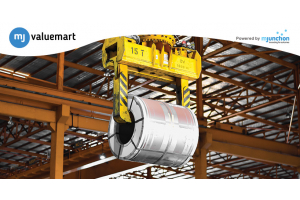Tips for Small Business Inventory Management

Inventory is one of the most crucial aspects of any business. Inventory management techniques can make or break business. For small businesses, inventory management is all the more crucial as it allows them to save money and improve cash flow. An effective inventory management system allows small businesses to accurately track incoming and outgoing goods and provides real-time data that help make informed buying decisions.
As one of the leading e-marketplaces for genuine and unused MRO spares, we share tips for small businesses to effectively manage MRO inventory:
Choose a method that works for your business: When it comes to inventory management, there are many types of methods used across industries. One of the most common ones are FIFO and LIFO. The first-in-first-out (FIFO) strategy means the oldest inventory items are always the first to go. This means, the businesses will not be left dead stock. Under Last in, first-out (LIFO), the most recent products in the inventory gets sold first. Both the systems have their own pros and cons. When choosing the best method that suits your business, keep the following factors in mind:
- Ease of record-keeping
- Inflation and deflation
- Smooth flow of goods
- Financial reporting
Accurate inventory forecasting: One of the most important elements of effective inventory management is accurate forecasting. An analysis of past sales records, market trends and seasonality can help businesses make data-informed decisions regarding the purchase of inventory. Many small businesses use inventory management software that can make inventory planning much more efficient.
Identify low turning stock: Inventory turnover refers to how many times inventory is sold and replaced in a specified period of time. Lower inventory turnover rates means slow moving parts, overstocking and increased holding costs. Identify low-turn stock and adjust procurement accordingly. For instance, businesses can sell low-turn key stocks before they become obsolete.
Consider drop shipping: Warehouse space comes at a premium, by getting your inventory drop-shipped, small businesses can eliminate the need to store the products on hand incur the related inventory costs. Drop shipping refers to an arrangement where suppliers directly ship products from their warehouses to the customers. This can to a certain extent eliminate warehousing and fulfilment costs.
Make sure the stockroom is organised: The organisation of the stockroom has a significant effect on inventory management efficiency. When inventory is not received, stored and accessed properly, the chances of inventory becoming obsolete are higher. Not only should the stockroom be managed well, all employees should be aware of standard of procedures (SOPs) to maintain and complete records when they take inventory out of the stockroom.
Buy and sell unused inventory: Many small businesses find it difficult to find MRO spares at discounted prices or are unable to sell their obsolete inventory at a fair value. mjvaluemart.com is a multi-vendor e-marketplace that connects the sellers with the buyers across the country. Small businesses can buy unused inventory at discounted prices from suppliers and manufacturers that have excess inventory. They can also get the best market value of your excess inventory by selling them to buyers. On the e-marketplace, small businesses can find MRO spares for mechanical transmission such as DC motors, ball bearings and valves. DC motor uses include converting direct current electrical energy into mechanical energy.
To become a registered buyer, click here.





